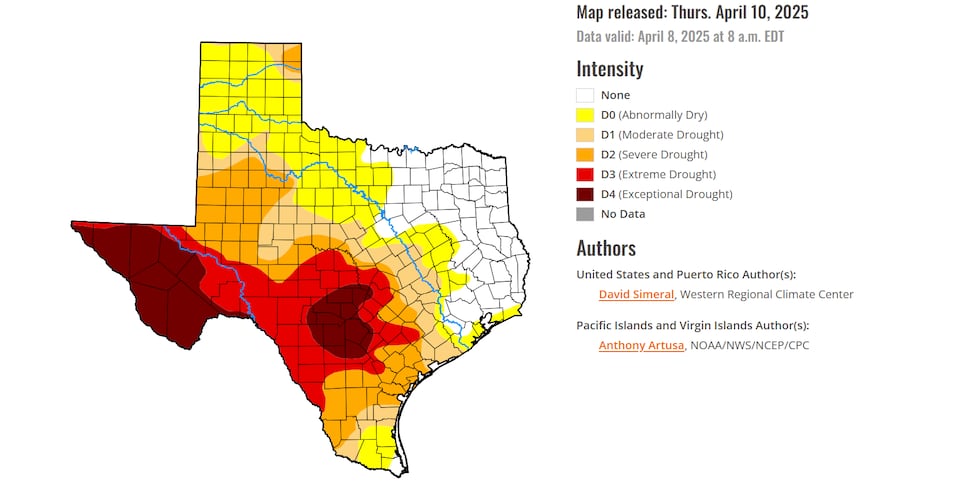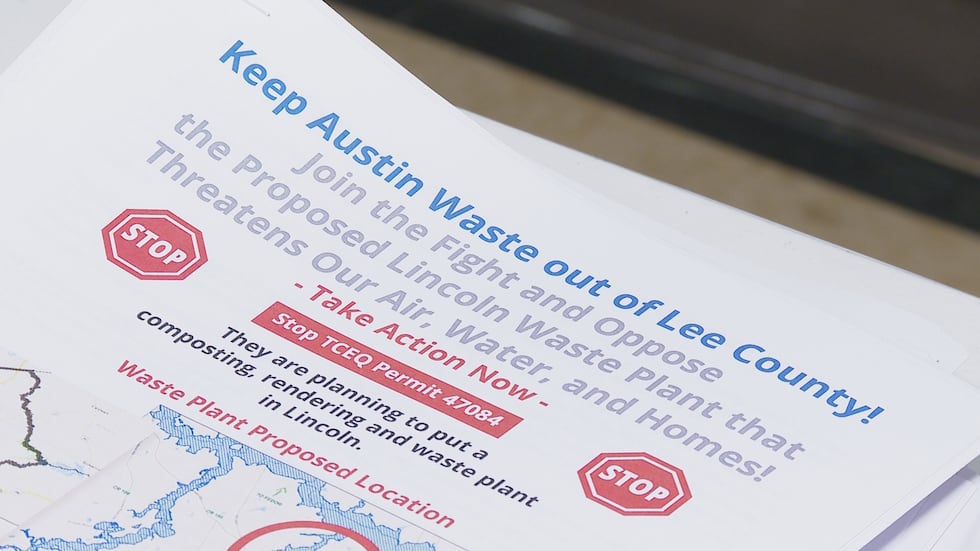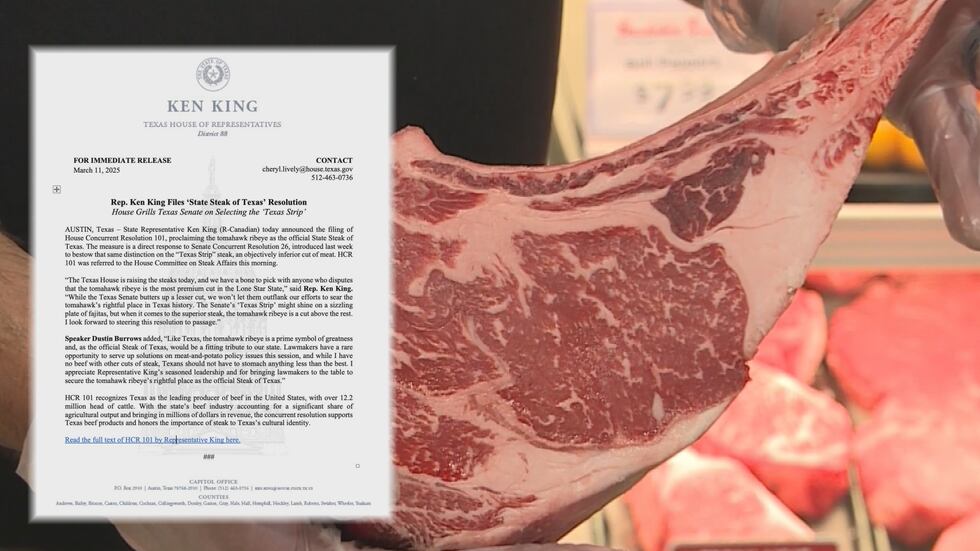This week in 89th Texas Legislature: Student discipline, drought management & more
AUSTIN, Texas (KBTX) - With just seven weeks left in the 89th Texas legislative session, state lawmakers are entering a critical stretch as they consider more key bills affecting rural environmental policy, public education, and infrastructure.
This week’s agenda includes a bill being watched closely by several Brazos Valley counties that would regulate composting facilities, a proposal overhauling student discipline in public schools, and a Capitol Day visit from a group opposing high-speed rail development in 10 counties.
Drought contingency bill set for hearing Monday
On Monday, the Senate Water, Agriculture, and Rural Affairs Committee is scheduled to hear public testimony on Senate Bill 2662, authored by Sen. Charles Perry (R-Lubbock).
The bill would allow the Public Utility Commission to enforce drought contingency plans more aggressively, giving the state greater authority to ensure water utilities comply with conservation measures during water shortages.
Supporters say the bill is a necessary step to improve drought preparedness, especially as much of the state continues to experience moderate to severe drought conditions.

House to debate major school discipline overhaul Tuesday
On Tuesday, the House is expected to take up for a second reading, House Bill 6; a comprehensive student discipline measure by Rep. Jeff Leach (R-Plano).
The bill revises how public schools handle serious misconduct and allows for new methods to remove students from classrooms— including court-ordered temporary placements for students deemed a threat. It also expands virtual alternative education options and clarifies when charter schools can deny enrollment based on ongoing disciplinary actions.
Supporters say the bill is about protecting teachers and students, while critics worry it may limit due process and disproportionately impact vulnerable student populations.
Rural compost regulation bill advances
Senate Bill 2078, authored by Sen. Lois Kolkhorst (R-Brenham), passed out of committee last week with an 8–1 vote and is expected to move to the Senate floor.
The bill was filed in response to a proposed compost facility in Lee County, which would process meat, dairy, animal carcasses, and more collected from urban areas like Austin. Residents raised concerns about the facility’s proximity to Yegua Creek, a tributary that feeds into Lake Somerville, a major drinking water source for the region.
If approved, the bill would give counties more control to prohibit compost operations near creeks, recharge zones, or municipal water sources.
Last October an ordinance requiring all multifamily communities with five or more dwelling units to provide their residents and employees with convenient access to commercial composting collection services went into effect in Austin. According to the city, Austin is the first Texas city to offer composting access for both single- and multi-family households.
Sen. Kolkhorst and lawmakers insisted the issue isn’t about whether composting is good or bad and has more to do with who decides where it goes and communication.
“This is a mandate from the City of Austin for their zero, whatever, blah, blah, blah, whatever,” Sen. Kolkhorst complained. “So, if they want to do it, that’s wonderful. Do it in your city limits.”
She continued, “It doesn’t say that it can’t go outside of the city limits. It can’t go outside the county lines. You just have to work with the local leadership.”
Sen. Charles Perry, who chairs the committee, restated the concern is about who gets to decide— not composting itself.
“Rural Texas consistently and continually is exploited for its value at the expense of quality,” explained Sen. Perry. “So, nobody’s disputing the value of compost… but there has to be a recognition of where you do it has to be responsible.”

Opposition to proposed high-speed rail returns to the Capitol
On Wednesday, members of Texans Against High-Speed Rail will travel to the Capitol to meet with lawmakers. The group opposes the long-delayed private bullet train project intended to connect Dallas and Houston.
The group’s Capitol Day runs from 10:30 a.m. to 3:30 p.m. and includes meetings with legislators, bill updates, and coordinated outreach to push for additional regulatory oversight or full cancellation of the project.
Earlier this month, the group testified in support of several bills hoping to put the brakes on the project for good.
“Every session since 2015, high-speed rail company reps have come to Austin touting their private project, repeatedly stating they didn’t need one cent from the state. Everything they said they wouldn’t do; they did. But we have continued to stand in the gap and everything we said would happen, unfortunately has happened,” Waller County Judge and TAHSR President Trey Duhon announced.
House Bill 1402, filed by Rep. Cody Harris (R-Palestine), would prohibit the use of any state or local taxpayer dollars to pay for altering roadways related to high-speed rail construction. Harris said the legislation responds to recent actions by Texas Central.
“Texas Central wants to skirt paying local property taxes that were owed but use local property tax dollars to pay for their project,” said Rep. Harris. “House Bill 1402 prohibits the use of taxpayer dollars in any form from the state to local level from being used to pay for the alteration of a roadway related to the construction of a high-speed rail project.”
House Bill 2003, authored by Rep. Cody Harris (R-Palestine) would require high-speed rail operators to disclose detailed project information— including costs, financing plans, and organizational charts— before applying for permits from the Texas Department of Transportation.
A bus from Ennis and Jewett will transport attendees, with a possible second route from Waller and Grimes counties based on demand.
A lighter item on the menu: State steak proposal
Also up for discussion this week is House Concurrent Resolution 101, filed by Rep. Ken King (R-Canadian), which would designate the tomahawk ribeye as the official state steak of Texas.
The resolution directs the Texas Department of Agriculture to promote the tomahawk ribeye as part of its broader effort to support Texas beef and agricultural products.
While symbolic, the resolution highlights the Legislature’s support for one of the state’s largest industries. Cattle production contributes more than $13 billion annually to the Texas economy.

What’s next
With several high-profile bills moving closer to floor votes, this week is expected to shape much of the final phase of the regular legislative session which is set to end on June 2.
KBTX will continue to track key developments from the Capitol.
Copyright 2025 KBTX. All rights reserved.















